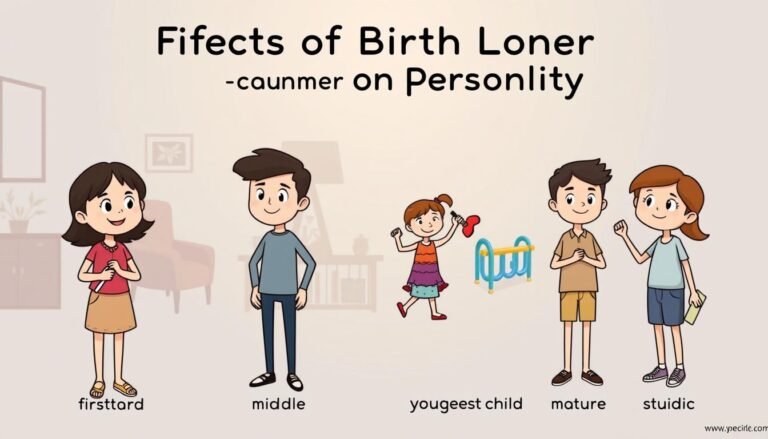Personality and Well-being: Keys to a Happier Life
Imagine Sarah, a 28-year-old with a smile that brightens any room. Her friends were curious about her constant positivity. Sarah’s secret was understanding the link between personality and happiness. She focused on emotional intelligence and mental health, not external rewards.
Many people are learning that true happiness comes from within. Studies show that our personality greatly affects our well-being. Let’s see how our traits can influence our happiness and life satisfaction.
A study of 1,503 Chinese students and adults uncovered interesting facts. It found that those with positive traits tend to find life’s meaning. This leads to greater happiness and social well-being.
The research also showed that being outgoing is linked to better social well-being. This supports earlier studies that found a strong link between personal and social well-being.
Key Takeaways
- Personality traits significantly influence life satisfaction
- Positive traits like extraversion are linked to higher social well-being
- Orientation towards meaning in life enhances well-being
- Emotional intelligence plays a crucial role in life satisfaction
- Mental health and personality development are interconnected
- Social connections contribute to overall happiness
Understanding the Link Between Personality and Well-being
Personality greatly affects our well-being and happiness. Recent studies have shown how different traits influence our lives and joy.
Defining Personality Traits
Personality traits are long-lasting patterns of behavior, thoughts, and feelings. The Big Five traits model is key to understanding personality. It includes neuroticism, extraversion, conscientiousness, agreeableness, and openness to experience.
The Impact of Personality on Life Satisfaction
A study in Nigeria with 732 participants looked at Big Five traits and well-being. It found that personality greatly affects our happiness and social connections. For example, those high in agreeableness feel happier and more connected socially.
How Personality Shapes Our Experiences
Our personality traits shape how we see and react to life. The study showed that those with high neuroticism might need help with emotional well-being. This shows the need for health plans that fit our unique traits.
“Between 20% and 60% of one’s temperament may be influenced by genetic factors, but significant life events can also shape our personality traits over time.”
Knowing how personality and well-being are linked helps us find better ways to boost happiness and life satisfaction.
The Big Five Personality Traits and Their Influence on Happiness
Personality tests are key to understanding happiness and life outcomes. A study in the American Psychological Association’s Journal of Personality and Social Psychology found a link between the Big Five traits and life satisfaction.
The study, with 9,110 participants in the Netherlands, showed some traits boost life satisfaction. Emotional stability was the strongest predictor of happiness in life and work.
Here’s how each trait affects well-being:
- Conscientiousness: Tied to work satisfaction
- Extraversion and Agreeableness: Linked to social satisfaction
- Openness: Increases satisfaction in later life
- Neuroticism (low emotional stability): May lower well-being and mental health in adulthood
The study found that personality traits affect happiness at all life stages. This means our natural traits shape our happiness throughout our lives.
Personality traits are 50% hereditary but can change. People become more agreeable with age. Those who become more open see the biggest boosts in happiness.
Knowing these connections helps us find ways to be happier. By doing things that match our traits or learning new skills, we can boost our happiness and life satisfaction.
The Role of Emotional Intelligence in Well-being
Emotional intelligence is crucial for our well-being. It helps us understand and manage our feelings and how we interact with others. Studies show that those with high emotional intelligence tend to be happier and more fulfilled.
Recognizing and Managing Emotions
At the heart of emotional intelligence is self-awareness. It means knowing your feelings and how they influence your actions. Those skilled in recognizing their emotions can better control them. This skill aids in managing stress and keeping a positive mindset.
Empathy and Social Relationships
Emotional intelligence is more than just self-awareness. It also includes understanding and connecting with others’ emotions. This empathy is vital for forming strong social bonds. People with high emotional intelligence tend to have better social skills, leading to more supportive friendships and work relationships.
Emotional Intelligence as a Predictor of Life Satisfaction
Research indicates that emotional intelligence is a better predictor of life satisfaction than traditional measures. A study on Hispanic participants found a link between higher emotional intelligence and better psychological well-being. The study also showed that:
- Emotional intelligence was positively correlated with perceived social support
- Those with high emotional intelligence received more substantial social support
- Self-care activities mediated the relationship between emotional intelligence and stress
These findings underscore the significance of emotional intelligence for a happier, more balanced life. By enhancing our emotional recognition and management, we can improve our well-being and foster stronger, more rewarding relationships.
Personality and Well-being: Keys to a Happier Life
Research links personality traits to happiness. A study of over 21,000 people found traits like risk-taking and commitment to family boost happiness. Feeling understood is the strongest predictor of happiness.
Positive psychology helps everyone find happiness, no matter their personality. Gratitude and self-compassion can change your outlook. These practices help you grow and find happiness.
A study of 180 university students found well-being is key to happiness. It shows a strong link between overall well-being and happiness.
“Most people show significant improvements in their well-being within five weeks when consistently using science-based techniques for enhancing well-being or emotional wellness.”
Building social well-being boosts emotional well-being. Skills like positivity and mindfulness are important. They help you grow and stay happy over time.
Improving well-being takes time and effort. Stay committed to your practices for lasting happiness and satisfaction.
The Harvard Study of Adult Development: Lessons on Happiness
The Harvard Study of Adult Development is a key study on adult growth. It has lasted nearly 80 years. It has given us deep insights into what makes life happy and healthy.
The Power of Relationships
One key finding is how important relationships are for happiness. The study started with 724 people and now includes over 1,300 descendants. It shows that how good your relationships are can greatly affect your health and happiness later in life.
- Those who were happiest with their relationships at 50 were the healthiest at 80
- Having strong social support was linked to less mental decline
- Women who felt secure in their relationships had less depression and better memory
Long-term Effects on Health and Happiness
The study’s results challenge old beliefs about aging and happiness. It shows that being happy in your relationships in midlife is more important than genetics or physical health. This highlights the need to care for our connections throughout life.
“Good relationships keep us happier and healthier. Period.”
Interestingly, the study found that people can change their personalities after 30. This shows that we can grow and improve our relationships at any age.
As we grow older, the Harvard Study teaches us to focus on our relationships. In a world where we spend a lot of time with media, not enough with friends, it’s clear. Building strong connections is the secret to a happier, healthier life.
Cultivating Positive Personality Traits for Enhanced Well-being
Personal development is key to shaping our character strengths and well-being. While our personality traits are stable, they can change over time. By focusing on positive habits, we can boost our life satisfaction.
Research highlights optimism’s role in well-being. It lowers depression and anxiety, boosts performance, and improves health. Developing optimism helps us bounce back faster and view life more positively.
The PERMA™ theory of well-being identifies five essential building blocks:
- Positive Emotion
- Engagement
- Relationships
- Meaning
- Accomplishment
By focusing on these areas, we can improve our well-being and life satisfaction. Studies show that pursuing well-being leads to better work, more fulfilling relationships, and improved health.
Character strengths are crucial in personal development. A study in India found all 24 character strengths linked to positive mental health. Hope, curiosity, and gratitude were the strongest predictors.
| Character Strength | Impact on Well-being |
|---|---|
| Hope | Strongly associated with self-compassion |
| Curiosity | Linked to mastery and self-efficacy |
| Gratitude | Improves life satisfaction |
By cultivating these positive traits and habits, we can enhance our well-being. This leads to happier, more fulfilling lives. Remember, personal development is a continuous journey that requires effort and self-reflection.
The Role of Social Connections in Personal Happiness
Social connections are crucial for our happiness and well-being. Studies show that strong social bonds can increase our life span by up to 50%. On the other hand, loneliness can be as harmful as smoking or high blood pressure.
Building and Maintaining Meaningful Relationships
It’s not just about how many friends we have, but the quality of those relationships. A study with 1,111 people aged 18-95 found that family ties and giving support lead to happiness. Giving support is more beneficial for our well-being than receiving it.
The Impact of Social Support on Mental Health
Social support greatly impacts our mental health. People with strong social connections have lower anxiety and depression rates. They also have higher self-esteem and empathy. Older adults with perceived support satisfaction have fewer depressive symptoms.
“The quality of our relationships determines the quality of our lives.” – Esther Perel
Lately, loneliness has been on the rise. In 1985, Americans had an average of three close confidants. By 2004, this number fell to zero for over 25% of people. This lack of connection can harm both our physical and mental health.
| Factor | Impact on Well-being |
|---|---|
| Strong social connections | 50% increased chance of longevity |
| Lack of social connection | Greater health risk than obesity or smoking |
| Perceived support satisfaction | Higher life satisfaction, fewer depressive symptoms |
To fight loneliness and boost our well-being, we must focus on quality relationships. By valuing social connections, we can greatly improve our happiness and health.
Mindfulness and Self-awareness: Pathways to Well-being
Mindfulness and self-awareness are key to better well-being. They help us handle stress, control our emotions, and see life’s challenges clearly. Studies show they boost well-being and self-awareness.
Research finds that mindfulness leads to better self-control and positive feelings. It also helps cancer patients feel less stressed and anxious. This shows mindfulness is great for reducing stress and managing emotions.
Mindfulness-based interventions (MBIs) are becoming more popular. They help change health behaviors and improve both physical and mental health. These programs teach meditation and require trained teachers to keep quality high.
People vary in their ability to stay focused on the present. Mindfulness training can improve this, leading to better well-being. By practicing mindfulness and self-awareness, we can live a more balanced and fulfilling life.
Source Links
- Good personality and social well-being: The roles of orientation to happiness
- Healthy personality development and well-being
- Personality and Subjective Well-Being: Towards Personalized Persuasive Interventions for Health and Well-Being
- Personality Types, Personality Traits, and Mental Health
- ‘Big Five’ personality traits linked to higher life satisfaction
- People With These Big Five Personality Traits are Happier
- The Relationship between Emotional Intelligence and Psychological Well-Being among Male University Students: The Mediating Role of Perceived Social Support and Perceived Stress
- The role of emotional intelligence and self-care in the stress perception during COVID-19 outbreak: An intercultural moderated mediation analysis
- How Does Your Personality Affect Your Happiness?
- Exploring constructs of well-being, happiness and quality of life
- What Is Well-Being? Definition, Types, and Well-Being Skills
- Over nearly 80 years, Harvard study has been showing how to live a healthy and happy life
- What the Longest Study on Human Happiness Found Is the Key to a Good Life
- PERMA™ Theory of Well-Being and PERMA™ Workshops
- Character Strengths, Character Building Experts
- The Relationship Between Social Support and Subjective Well-Being Across Age
- Connectedness & Health: The Science of Social Connection – The Center for Compassion and Altruism Research and Education
- Mindfulness and Self-Compassion: Exploring Pathways to Adolescent Emotional Well-Being
- Mindfulness and Behavior Change – PMC








